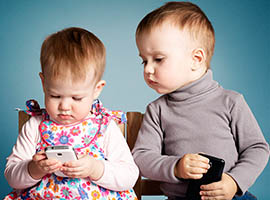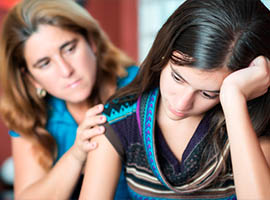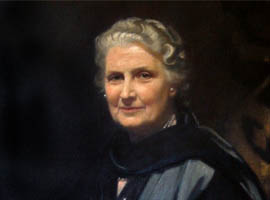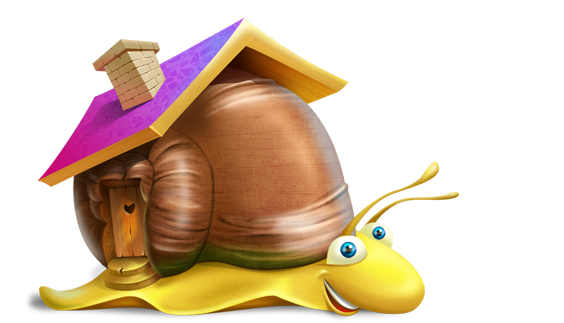Various Articles and Tips for Parents from a Child Psychologist

Technology and children
If there is a possibility to change the circumstances then change it. If not, find the reason to make these tests worthy. Someone can find an outlet in faith.
It happens that we are often surprised to find out that our children, despite the age difference between us, repeat everything that we do involuntarily...even for themselves. The model of behavior is completely ours – parents! We can watch a touching talk show that we think is for housewives, and at the same time, hear from a 14-year-old teenage boy, "Oh, I watched it on YouTube!". Even if we ourselves watch YouTube, shows, interviews, or bloggers, we raise our heads surprised when our children behave in the same way. We go to the Internet for training in languages, science, watch good movies, and other useful information. What happened to us?
Again, psychologists basically agree that these problems begin with the parents. One psychologist recently said that a person, whether it's an adult, a child, or a teenager, uses the Internet all of the time to play games or watch something because he is not interested in real life. That is, a person does not have a life that he would like because the life seems more routine. Victor Frankl, the author of Existential Psychotherapy, proved in his works and in his experience in working with people that even in the most terrible conditions (German concentration camps for example) a person can endure everything including routine, hopelessness, etc., provided the main thing - it is to find the sense of life.
If there is a possibility to change the circumstances then change it. If not, find the reason to make these tests worthy. Someone can find an outlet in faith.
If this simply concerns our everyday life then maybe there is not enough purpose or interest. Find yourself and your children worthy pursuits that would enthrall you and your children. Then, the Internet will serve as a means to just see the necessary information because they will have no free time.
Pavlov, another outstanding phycologist, has a theory called the Theory of Pavlov's Teaching or the Theory of Conditional Reflexes. He came to the conclusion that "the flexibility and plasticity of the nervous system makes it possible to change the reflexes of any degree of complexity in the right direction. That is, in the behavior of living beings, the inherited reflexes play a minimal role, while the leading reflexes play a minor role, the conditional one." Simply stating, taking pleasure in some kind of activity or praise, we stimulate our desire to do our favorite things which certainly is useful for us and perhaps for other people.
This is good news for us because we can do two main things to solve the problem:
1. Find a suitable favorite activity.
2. Apply for a job, enjoy your favorite occupation, thereby stimulating your body which is good and pleasurable.
Author: Svetlana Bozhieva
Child Psychologist

Evaluating yourself as a mom
And then, when the children grow up, we start to educate them again, but by that time it's too late
Today, I read a Facebook post How "Spoiled Is Your Child?" I am still looking for the perfect upbringing of children. I never want to do the same as my parents did because they were just too busy. In my own mistakes, I blamed them often and said to myself that I would never do that with my children.
Regardless of my wishes, I did do the same acts. I then reproached myself and was blamed for the fact that I didn't do what was written in the books; not as I wanted to do them. This is probably the scourge of our society with there being too many theories. Psychologists Makarenko and Sigmund Freud say that all problems come from childhood, and they are right to some extent. We can say after reading such works "Yes, that's the reason. All of our parents are guilty, and we cannot change anything". We can spend the rest of our lives accusing our parents and their incorrect education. Then in a spirited mood, educate our own children by passing on to them our attitude about parenting while accusing our children also. So, going back to the post about spoiling, I was surprised to find that while we think that we are not giving the child enough, we are also suffering with a conscience about how bad of a parent we are. We can pamper a child by giving them attention, money, a clean home, and constant care, but he grows up to be selfish and always unhappy. The worst thing is that child is growing up unhappy because the unhappy mother gives him her feelings and an understanding that something is constantly missing, yet having everything for happiness. And then, when the children grow up, we start to educate them again, but by that time it's too late.
So, the conclusion for today is:
- Live your life, rejoice, and do something except homework
- Give your child the best possible experience and knowledge
- As your kids are growing up, custom them to independence
- Do not let go of your hands, and do not lose heart. This is bad for you and the child because the child "reads" or uses this pattern of behavior.
- Strive for the ideal, but remember that we will never be ideal.
- Appreciate and respect yourself and your household.
Author: Svetlana Bozhieva
Child Psychologist

How are you to train your child?
It is a proven fact that, anywhere in the world that has had success in the area of education has adhered to one very simple and standard rule, i.e. the positive cooperation of an adult with a child.
Today I met in a cafe with one of my friends. She, an 8th grade biology teacher, mother of three children – shared negative emotions about our school education, and was interested in distance education for her 7th grade daughter. It's no secret that the education system is in dire need of some reformation! I'm rather certain that most everyone is aware of this. That being so, how exactly can a child be educated, raised and protected so that there are minimal casualties to his or her fragile psyche? We are not the first generation to have asked this question. It is a proven fact that, anywhere in the world that has had success in the area of education has adhered to one very simple and standard rule, i.e. the positive cooperation of an adult with a child. This ideology is derived from most all domestic psychologists, says L.S. Vygotsky.
It is imperative that ethics and morals be incorporated into everything that is taught. As noted by J. Bruner, one of the ways to overcome the difficulties of today's teaching material, and there also, stimulate cognitive growth, is to challenge the child to test his or her strength capabilities. Allow him to give his best, and to feel the power of victory. Give him the opportunity to experience the joys of successful labor, and then to reap the benefits thereof. A good teacher knows the power of this method, but how very few are able to create such an atmosphere for students, or find a good approach. Cooperation between the child and the adult creates a zone of immediate development (Vygotsky).
In life, parents take a very active role (whether they know it or not) in their child's psychological development. It may be by personal training, or it may be by example alone. With personal training, they could either teach the child themselves, choose a tutor for specific subjects, or select additional classes according to the child's interests. The most important thing is the teacher's positive attitude, and the environment which is chosen by the parents.
So, in short, learning strategies:
- Interests of the child
- A positive approach
- A call to solve a new task
- Choosing a learning environment
- For young children – the game form of training, visualization
Before making a choice as to what teaching method we take, exercises we choose, etc., the main thing that we need to understand is the approach we take with our child(ren), and then we can select techniques based on their temperaments, and teaching materials based on their abilities. The best of luck to you!
Author: Svetlana Bozhieva
Child Psychologist

Am I a good mother?
So, in order to be a good mother, you do not need to know all the scientific theories about upbringing, worrying about things that may not have been done. Here is a simple rule - with love, good examples, correction, and choice giving, live with your children, enjoy life together while loving them immensely.
From time to time we ask ourselves such questions. Do we not? You have probably yourself searched for answers on this subject. Perhaps you've looked for advice through the Internet, or sought it from your girlfriends, from relatives, friends, psychologists, or even various experts. Each person's opinion will most likely be indistinguishable from the rest! Some say that children need to be taught, instructed, directed, strictly monitored after rules have been implemented – these same are, in a way, correct. Others say – you need to give maximum freedom to them, they themselves know what it is they need, and what they do not – these are also right in a way. But if you take into account the first option, and what its natural byproducts are, you will find fromit that...
1. The child can begin to live someone else's life, most likely not listening to his own desires, or dreams, ultimately being deprived of what he truly wants. Thereafter being left to become something resembling that of janitor.
...and also...
2. The child (especially a teenager) may rebel and not do what the adults ask, simply by spite, even if he understands perfectly well that his behavior will not do him good. He may possibly end up with a ruined life.
As you can see, these are both negative. In the second case, if the child is allowed to do everything, two possible variants of are foreseen:
1. The child may not understand what is acceptable and unacceptable, and may break the boundaries of socially acceptable behavior. The child may become “spoiled” if left alone to fulfill all the whims of his own heart. This is a possibility if you allow TV, Internet, and sweets to be unrestricted.
2. If the child has good examples though, what he sees, he will become – this regards parents, teachers, and people he likes. The child will naturally aspire to imitate these in his or her early childhood, and in adolescence follow the dreams and aspirations began long before. As a consequence, the child does not need to be constantly persuaded and guided, he knows what he wants and he does everything himself, and to his own liking.
So, in order to be a good mother, you do not need to know all the scientific theories about upbringing, worrying about things that may not have been done. Here is a simple rule - with love, good examples, correction, and choice giving, live with your children, enjoy life together while loving them immensely. You'd be surprised to find that this does not happen often!
And, of course, do not neglect who you are yourself, for we are our children's greatest examples.
Author: Svetlana Bozhieva
Child Psychologist

What is the Teaching Method of Maria Montessori?
We all have seen the curiosity in a child's eyes. There always appears to be a constant “why”. This is actually one of the signs of the natural curiosity a child has, and, to some degree, it is a sign of the training he or she has already received.
Maria Montessori's teaching methodology has become very popular in today's zeitgeist. Her technique was recognized though, after she had already passed. She was one of the first learned women in all of Europe in the late 19th and early 20th century. She used this method with mentally challenged children; and, miraculously, these same children were in the end more learned than those without handicaps at all! She believed that the mundane methods used for teaching children in schools would not be motivational enough. I.e. sitting at desks, lack of mobility, or activity – she believed that all this did was add to the oppression of the children. This became the basis of her pedagogical activity – her aim was not the suppression of the child, by teaching and discipline, but it was the assistance of finding out their interests, which would add to their cognitive process of the things around them. Nowadays this should be a very urgent topic. Let us consider it in more detail.
Sensitive (specific periods where children are susceptible to accepting new information) periods by Mary Mantessori:
- from 0 to 6 years – the period of speech development
- from 0 to 3 years – the period of perception
- from 0 to 5.5 years – the period of sensory development
- from 1,5 to 2,5 years – the period of perception of details
- from 1 to 4 years – the period of mobility
- from 2.5 to 6 years – the period of development of social skills
We can use the knowledge of these periods to better understand the needs and opportunities of our children. Be sure in this all that you remember this one foundational rule - “help him or her to do it alone”. This is to say that we are not to do everything for the child, but to advocate their stimulation through the child's own activity; to evoke interest within him or her by natural introduction.
We all have seen the curiosity in a child's eyes. There always appears to be a constant “why”. This is actually one of the signs of the natural curiosity a child has, and, to some degree, it is a sign of the training he or she has already received. So therefrom lies the opportunity for us to take it easy (not too much) and go with the flow, enjoying the growing process, by simply doing things like, answering their endless questions, and introducing further the things they find pleasure in.
Here is a brief description of this theory.
Author: Svetlana Bozhieva
Child Psychologist

At what age is it best to teach your children?
The child learns from birth, and if smoothly transitioned, he or she can be gradually transferred to more complex levels, one must also take into account the personal needs of each child, using their various idiosyncrasies and talents to your advantage.
Parents often ask themselves how they are to deal with their children, how they are to give them everything necessary to succeed, and not just how to provided food and clothing. After all, in this day and age, everything is a lot more complicated. There are more choices and opportunities; we have to choose from many different options. There are private kindergartens, early childhood development centers, tutors, and many more things to help prepare our children for their later education; things that are utilized so that we might be the best parents possible.
There are different opinions on when it is we should educate our children. Some of the most common examples being: 1. Do not deprive your children of their childhood, they will learn regardless of the level of formal education; 2. The earlier, the better; 3. Leave it to the teachers at their schools, they can probably do it better – So then, what do we do?
As a mother of six children and a psychologist, let me share some observations. Perhaps you are a young mother, or already have a lot of experience, yet still have many questions.
According to the research and development of such psychologists as: Maria Montessori (adherent of early development of children), Glen Doman, L. Colberg, at each age, the child can learn certain skills at every stage in life, therefore it is extremely important that not any age is missed. So, Maria Montessori, there are various methodologies available, which is correct when it comes to the child's natural growth? For example, according to Montessori, in the period from 0 to 6 years, the child's speech is developed. It is interesting that children start to actually learn how to talk from their birth. They do so by listening to everyone around them. They are also constantly repeating various sounds. During this time, we are to play with our children. We can even start introducing the alphabet, and many other figures. As the child learns to speak, he or she can learn, one can implement more and more. There are many good books on this subject. Thus, it is possible to carry out the learning process quite early,
From the age of two it is possible to start going out and doing developmental activities (of course in the form of a game, and in a convivial atmosphere, as Kolberg insists). In this he is right. So then, we have an answer as to what age we should start teaching our children: The child learns from birth, and if smoothly transitioned, he or she can be gradually transferred to more complex levels, one must also take into account the personal needs of each child, using their various idiosyncrasies and talents to your advantage. Maria Montessori, a neuropsychologist, described special periods when the child is more susceptible to information (more details about this technique are described in the article “Maria Montessori Methodology”).
I wish success to you and your children.
Author: Svetlana Bozhieva
Child Psychologist



![Validate my RSS feed [Valid RSS]](images/valid-rss-rogers.png)